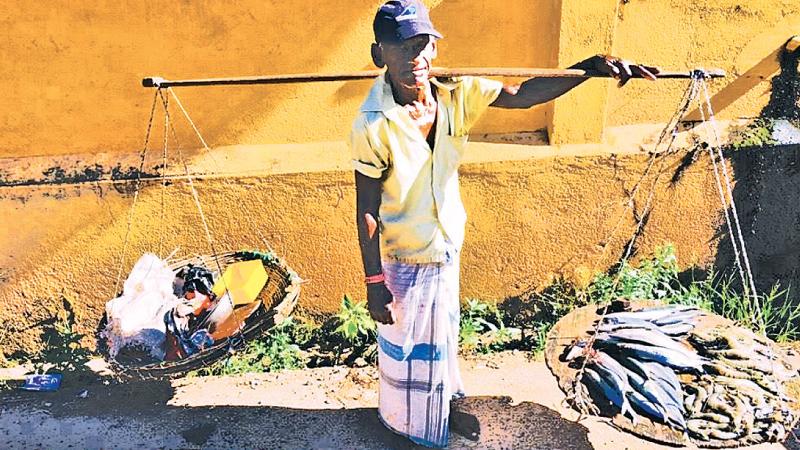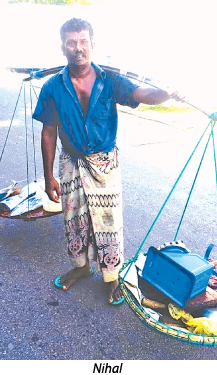
Fish, whether fried or in a spicy curry is the choice of many Sri Lankans. We are an island and it’s no surprise that seafood is our desired choice of cuisine. For centuries, fish was sold, beginning at the beach where the boats came ashore early morning. This practice still happens at the Negombo beach.
As people began living inland the demand for fish had to be met, and thus the trade of the mobile fishmonger with his proclamation of fresh fish. Today, thousands buy their seafood from supermarket counters. Others buy from “trusted” fishmongers on bicycles and motorbikes, who excel at chatting up the housemaid.
We set off on Sunday morning by 6.30 am in search of the solitary fisherman who still maintained the old practice of carrying his fish in a creel basket that is suspended on a wooden pole. Driving past Moratuwa and Panadura we searched earnestly to find at least one of this vanishing tribe. We did pass the ‘motorbike’ fishmongers.
 Driven by our quest to succeed we returned and looked into by lanes and private roads around Ratmalana. As we neared Hill Street, Dehiwela around 9am to our delight we spotted the solitary soul walking at a steady pace. Not wanting to alarm this old man we positioned ourselves along the road and gently asked him to stop. Thinking of making a sale he began to unleash in a deep voice, describing in detail the day’s catch and the price. When he was told we are from the press, he looked half surprised, tainted with a look of suspicion. For, this worthy has been doing this for 30 years and no one stopped to ask him his story, let alone his name.A cat enticed by the smell of fish, also eagerly sits nearby. Denzil Perera has walked along Galle Road, selling fish, following in the footsteps of his departed father, Cyril. He said, ‘I begin my day at 7am and by 12 noon I have sold all my fish”. He explains, ’People ask me to use a cart or a bicycle. Why should I use a cart? I am physically fit and can carry this load.
Driven by our quest to succeed we returned and looked into by lanes and private roads around Ratmalana. As we neared Hill Street, Dehiwela around 9am to our delight we spotted the solitary soul walking at a steady pace. Not wanting to alarm this old man we positioned ourselves along the road and gently asked him to stop. Thinking of making a sale he began to unleash in a deep voice, describing in detail the day’s catch and the price. When he was told we are from the press, he looked half surprised, tainted with a look of suspicion. For, this worthy has been doing this for 30 years and no one stopped to ask him his story, let alone his name.A cat enticed by the smell of fish, also eagerly sits nearby. Denzil Perera has walked along Galle Road, selling fish, following in the footsteps of his departed father, Cyril. He said, ‘I begin my day at 7am and by 12 noon I have sold all my fish”. He explains, ’People ask me to use a cart or a bicycle. Why should I use a cart? I am physically fit and can carry this load.
This system allows the buyer to have a good visual of my fresh fish’. Indeed, a finer point in marketing: a clear view of the desired product. So for three decades, the defiant Denzil has managed to survive-enduring the hot sun (and inconvenient rain), confusing traffic on the Galle Road and the random dogs that bark. Perhaps, we can assume that he has some faithful homes where he is welcome with compassion. He knows no other skill and this is his only income.
The wooden pole with 2 baskets has been used to carry food produce for centuries in Asia. It can still be seen in countries such as, Vietnam and India.
As we drove along Jambugasmulla Road, Nugegoda, we happened to come across Nihal, another fish vendor walking with much eagerness and his catch phrase of “maalu maalu”. As we motioned to him to stop he seemed surprised. He too thought we were going to buy his fish and the large prawns. Nihal is much younger in comparison to Denzil, and looks more robust. He dodges the question regarding his age. He too has been engaged in this trade for a number of years. Nihal says, “I also prefer this style, rather than using a cart or a cycle. I have my regular customers- housewives who buy from me. We always strike a reasonable bargain”. Nihal has a blue weighing scale and a cutting board. A long iron knife completes his equipment.
As he cuts away at a fish, a number of crows begin to hover around. With the modern convenience of buying fish at supermarkets why do people still prefer to buy from these vendors? The advantage is that the fish is brought to your very doorstep. But, on the flip side there is very limited choice. Somehow, there seems to be a nostalgic and sentimental bond between these vendors and their customers, who are fairly older citizens. One thing that old Denzil and robust Nihal had in common was varicose veins that adorned their strong feet. Years of relentless walking has permanently taken its toll on these men, and others like them.
The Colombo city is subject to concentrated urbanization with emphasis on modern lifestyles that pave the way for convenient shopping ‘under one roof’. Time is precious for the city dweller. These vintage vendors make a basic profit, enough to get them by for one or two days. There are days that the ocean is turbulent and the boats don’t go out to sea. On these days there is no catch, which results in no sale for this humble clan. Denzil and a few others roam the streets like relics from yesteryear. They have no savings or pension. Uncertainty looms about their future.
Perhaps, like the waves of the ocean they will rise and fall, and slowly fade away into the distant sunset.
Pix: N. Timothy
